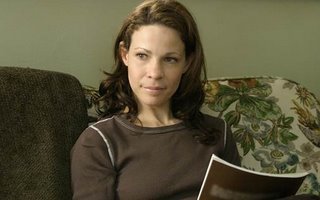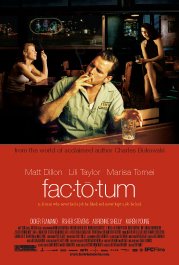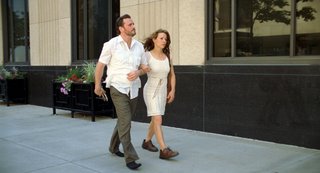Amy Smart: Crank (Q&A)
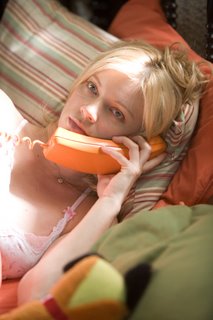 *Q: What do you think the audience's initial reaction to all of the action in this film will be?
*Q: What do you think the audience's initial reaction to all of the action in this film will be?Amy Smart: I think this film will definitely surprise people and keep them going from beginning to end, non-stop -- keep their heart rate up; it will completely rock their world. I don't think it's boring at one bit -- I just think it will keep you entertained from beginning to end -- it's like a big rollercoaster.
Q: In the bio it says that you'd always wanted to get into an action flick -- did you want to do more kicking and scratching?
AS: You know, it's fun. I'm kind of doing that in a TV show I'm doing right now, Smith. I have a lot of that going on so I got my fix from doing Smith. I was happy to be a part of the stunts and climbing fire escapes four stories up and dodging bullets. I don't, necessarily, feel like I've got to do a lot of action films but I had a great time working on this one.
Q: Well, this is your first one or was it Starship Troopers?
AS: Yeah, it's my first one -- I had a tiny part, though.
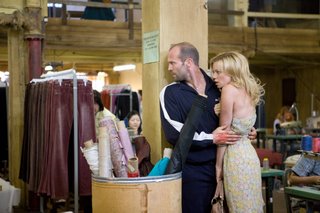 *Q: How was it working with Jason Statham because he's got a couple of action flicks under his belt.
*Q: How was it working with Jason Statham because he's got a couple of action flicks under his belt.AS: I loved him! He's so talented, you know, he's from the streets. He's got a lot of street smarts and life experiences and he brings that to his work. He's raw and he's direct and he's so funny -- he's got the great British sensibility...I love British people, I think they're more aware of what's going on in the world, more educated in some ways because America can be very isolated in it's own view of the world and basically think that it is the world. So, I find, for the most part that when I meet British people, they there's a stronger sense of values of the world as a whole. And Jason, to me, he's kind of like an underdog. As a British actor, he hasn't done what most British actors have done which is like gone to 'this training school' and 'this theatre' [for classical lessons]. He's really working with his instincts -- I think as an actor that's really important to keep in mind because I think a lot of theater schools can train that out of you.
Q: So getting to that, do you think his past of working as a busker on the street of London helps him out?
AS: I think it's made him the kind of actor that he is today, absolutely.
Q: You live here in L.A., some actors don't like to work here and live here was that a big deal for you?
AS: No, it's kind of fun because I do live here and it was nice to go to work and come home at the end of the day. It's fun shooting around L.A., it's got amazing aspects to it and a lot of times in L.A. [people] tend to spend a lot of time in certain areas. It was fun to get out and see more of the aspects of the city and to feel the pulse of different neighborhoods.
Q: Yeah, I get dim sum in Chinatown all the time -- did you guys shoot that public sex scene down in the real Chinatown square or what?
AS: -- that was shot in San Pedro.
Q: You and Jason were getting buck wild -- I was like 'WTF?!' Where's this going? I wasn't expecting that! Was it difficult to do in front of all of those extras and crew?
AS: Well, I read the scene in the script and I was like 'oh my god, what the hell?' But it was fun because Jason and I were both apprehensive and nervous and embarassed because we were like 'okay, we've got to go and shoot this -- let's go for it! I couldn't have done it by myself. I knew that if we both were putting ourselves on the line, then it wasn't just me.
 *Q: So is the character Eve anything like Amy?
*Q: So is the character Eve anything like Amy?AS: There are definitely parts of me that are like Eve -- I'm always up for an adventure. But Eve lives in her own world and she's not aware of the pace of the people and the life around her. She lives her life the way she wants to, she can't really hold a job -- she's a trust fund girl that can survive on her own.
Q: Are there any trust-afarians that you know personally that you drew on?
AS: Yes, [women] that do have that lifestyle, that are kind of lazy and only interested in what they want and there's no time frame. There's no urgency because they've got nothing that they'd really need to do. So she, I think, is creative but getting by on a day to day basis and just making money is just not a part of who she is.
Q: So what's up with the TV show Smith, break it down; what's the premise and who do you play?
AS: Smith is a crime drama with Ray Liotta as the main character and he has a family life. He tries to lead this normal life with his wife, Virginia Madsen, and his kids but on the side he pulls these huge, multi-million dollar heists -- he's a master criminal and thief. I'm one of the criminals in the crew that he works with, I'm the only female, Annie. And my character's very smart, very strong and very dangerous -- she'll do anything to get what she wants and she will use her sexuality to get it.
Q: She's a dancer or something like that?
AS: She's a showgirl for fun, she's multi-talented and I love playing her.
Q: I know it's an action film but do you think there's an underlying message to Crank?
AS: I think the fun part is that you do really see that life is meant to be lived to it's fullest -- and try not to be a hit man because you'll be shot up with Chinese poison. [laughs]
Q: You're engaged, right? In the film, Eve falls for a tough guy, did you?
AS: I'm not engaged, actually, I mean I've been with the same guy off and on for many years...In some ways I think there is a draw to tough guys; guys that live on the edge and take risks.
Q: What kind of music's in your iPod? What're you listening to these days?
AS: I like so many different kinds of music, I just got this Sarah Vaughan and recently I just got Madonna's new LP, Confessions on the Dancefloor. I like the new Yeah, Yeah, Yeahs. I like Nikki Avalon. I like soulful music like Sting and Seal and U2. And then I like Queens of the Stone Age -- I just like a little of everything.
Q: Is there one act, that really speaks to you?
AS: I like Pink -- she's a friend of mine.
Q: You like what she has to say about things, I take it?
AS: I do, I really do.
*photo by Ron Batzdorf
Crank opens nationally on September 1st

